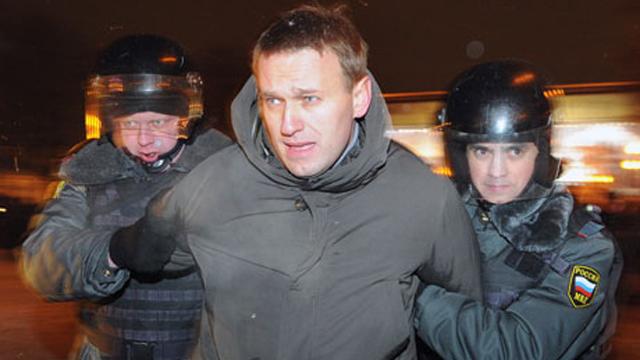
As the late afternoon approached at Moscow’s Lubyanskaya Square on Saturday, several thousand Russian opposition supporters, young and old, began laying flowers at the Solovetsky Stone, a memorial to the victims of Soviet-era political oppression. The symbolism could not have been more stark. At the same time, police forces wearing flak jackets and helmets had blocked off the entire city center and were notifying citizens of their “constitutional right” to leave so that order could be maintained.
“I don’t know how many people are here, but I am proud of each and every one of those who came,” said well-known blogger and anti-corruption activist Alexey Navalny before being detained. “The main thing is that people are here, that they are expressing their views and showing that they exist.”
Such minimal expectations might seem disappointing for a movement that one year earlier saw tens of thousands in the streets of Moscow protesting Vladimir Putin and the parliamentary elections, but opposition leaders have been working under severe repression. In early December, when members of the Opposition Coordination Council submitted an application for the demonstration to the mayor’s office, they were met with an official ban. It seemed the authorities were not pleased with their idea for a March of Freedom, protesting recent political trials and commemorating the movement’s anniversary with such the slogans as “Freedom to political prisoners,” “Down with the dictator” and “Early election.”
The reaction from opposition leaders followed without delay, as they promised to get around the ban. Left Front leader Sergei Udaltsov wrote on his blog: “Our gathering will not be officially considered a rally. Moreover, we do not plan to violate the ban and organize a non-sanctioned rally, but I am personally coming to Lubyanskaya Square on December 15 at [3:00 p.m.] as a free Russian citizen and nobody can ban this!”
Moscow police, however, were not swayed. They arrested Udalstov, Navalny and opposition activist Ilya Udalstov on their way to the square, right in front of the former KGB headquarters. Although they were later released without charges, the move was no doubt intended to intimidate others from joining them. Nevertheless, according to the opposition, around 5,000 people attended the demonstration. Police estimates were much lower, at around 500. They also arrested 40 people for chanting slogans against the ruling party and Russian political leadership.
When asked about possible future objectives for the opposition movement in Russia, Yevgeniya Chirikova, member of the Opposition Coordination Council, said “It has been a year since the first big demonstration…but what have we achieved so far? The oppressive regime is fabricating investigations against innocent people, adopting undemocratic laws. Apparently, our society is vulnerable to the repressive machine.”
Back in May, 19 people were arrested after clashes broke out between police and protesters during an anti-Putin demonstration on the eve of his inauguration. Although the activists claim police instigated the violence, one of the activists has already pleaded guilty to criminal charges and was sentenced to four and a half years in prison. Speaking to Voice of America, human-rights campaigner Lyudmila Alexeyeva called the verdict “just the beginning” of “an offensive against leaders of the opposition.”
Meanwhile, other activists, such as Leonid Parfenov and Dmitrii Kozlovsky, seem to be much more optimistic. They claim that the opposition currently headed by the Coordination Council has an obvious strength in its commitment to nonviolence. Right from the start, the movement was defined as peaceful resistance against institutionalized corruption, violations of human rights and freedoms, and sociopolitical and economic stagnation. “No provocations, no stones… We are not fighting the regime with its own weaponry!” said Navalny.
However, the lack of clear strategy for how to implement and fulfill the movement’s objectives still can be considered a key vulnerability. “The main problem of the opposition is that it does not understand the interests of the regions,” said Levada Centre Director Lev Gudkov in an interview with the French newspaper Liberation. “The political ambitions of the oppositionists are absolutely contradictory.”
If the latest demonstration has proved anything, it is that in order to represent real alternative power, the opposition needs to finally reach consensus and act consistently, as a team. Only then can words like those of the poet Dmitrii Bykov ring true: “We are still here, we are not going anywhere, we are still the lawful citizens of our own country and have the right to express our democratic wills and demands.”
3 WAYS TO SHOW YOUR SUPPORT
- Log in to post comments











